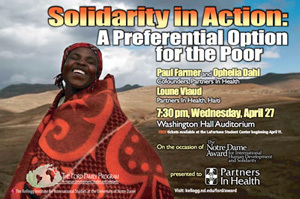
Partners in Health (PIH) will receive the 2011 Notre Dame Award for International Human Development and Solidarity in recognition of its contributions to the field of human development. The award will be presented at a ceremony April 27 (Wednesday) at Notre Dame.
Selected by the Ford Family Program of the Kellogg Institute for International Studies, which supports research, teaching and direct engagement with communities burdened by tremendous challenges, the award recognizes individuals or organizations that stand in solidarity with those in deepest need, working alongside them as they become agents of their own change. Recipients are honored for substantial contribution to the promotion of international human development through research, practice, public service or philanthropy.
“PIH does an extraordinary job of integrating the head and the heart in the work of healing,” says Rev. Robert A. Dowd, C.S.C., director of the Ford Family Program. “Their work represents the values that are at the core of Notre Dame’s mission. We want to honor the work of PIH so that it might continue to inspire Notre Dame students, faculty, alumni and friends to contribute in their own way to the healing and peace that our world needs.”
Following the award ceremony, PIH co-founders Ophelia Dahl and Paul Farmer, together with Loune Viaud of PIH, Haiti, will deliver a public address, “Solidarity in Action: A Preferential Option for the Poor,” in Notre Dame’s Washington Hall. Tickets are required and are available at the LaFortune Student Center ticket office. The presentation will be streamed live on the Web.
Farmer and Dahl were in their early 20s when they began the work that would become Partners in Health. Their involvement with community-based projects in rural Haiti inspired other initiatives, which evolved into the organization as it stands today.
With close ties to Harvard Medical School, PIH now operates in 12 countries in Latin America, Central Asia, Africa and the United States. It has more than 60 hospitals and health centers, a staff of 128 in Boston, and more than 12,000 colleagues worldwide.
PIH draws inspiration from the Catholic social teaching of “a preferential option for the poor.” The organization seeks to fulfill this moral imperative by raising the standard of health care available to marginalized, vulnerable populations, through service, training, advocacy and research.
PIH has successfully implemented high quality interventions in low-resource communities for “untreatable” health problems thanks to innovative partnerships. Their delivery of anti-retroviral treatment for HIV/AIDS and treatment of multidrug-resistant tuberculosis in challenging settings has drawn international attention. Other agencies emulate their community-based model of care, and their proven strategies have influenced international health policy.
Contact: Tony Pohlen, Ford Program, 574-631-7022, apohlen@nd.edu; Lacey Haussamen, Ford Program, 574-631-4367, lhaussam@nd.edu